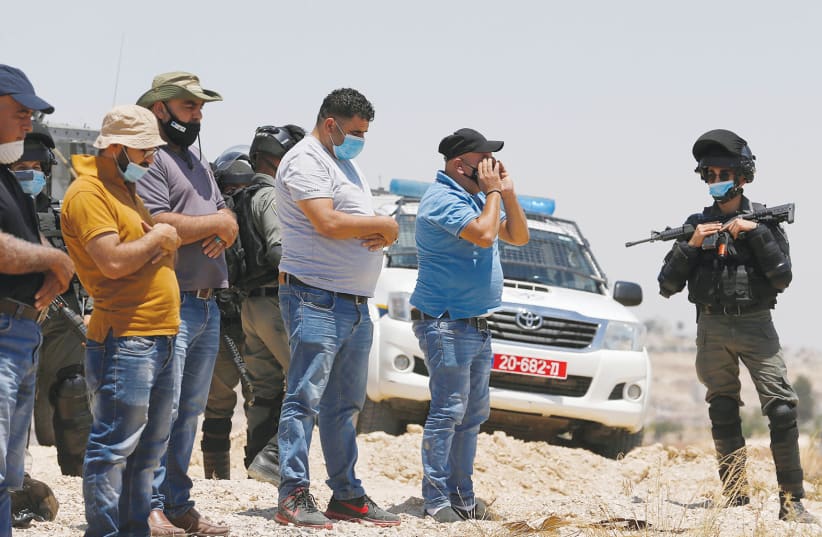The NGO HaMoked announced on Monday that it has petitioned the High Court of Justice to compel the IDF to cease night arrests of Palestinian minor suspects.
Filed on Sunday, HaMoked sought to enforce an Israeli program to bring Palestinian minors to the police or to court using a voluntary summons pilot program started in 2014.
The NGO said the summons program was barely implemented. “Contrary to its own regulations, the Israeli military arrests hundreds of Palestinian teenagers in their beds in the middle of the night, in a systematic violation of their rights.” Instead of summonses to Palestinian minors being the norm, and night arrests a last resort, night arrests are the norm.
The IDF responded saying, “In recent years, many Palestinian minors have been involved… with terror activities, nationalistic terror and incitement to terror,” leading to “the murders and wounding of many Israeli citizens.” This situation left no alternative other than arrests and trials, the IDF said, but insisted it always “preserved the human rights of minors.”
The IDF said it applied summonses “in cases where this was appropriate,” but that, “in many cases this approach was not possible.”
Former IDF prosecution chief in the West Bank Lt.-Col. (res.) Maurice Hirsch responded to the report, saying that there is no international or domestic legal requirement either to attempt a voluntary summons or to prohibit night arrest, and that the summons program was a voluntary program undertaken by the IDF.
The report is based on 81 affidavits HaMoked took from boys aged 14-17 arrested in 2018-2019. Of these, 58 were detained at home between the night hours of 11 p.m. and 5 a.m.
According to the report, “56 out of 58 boys said they did not receive any written or verbal summons, which could have enabled them to come in for interrogation of their own accord, making the traumatic night arrest unnecessary.”
The IDF rejected this claim, saying that all arrests included notifying parents in Hebrew and Arabic of the circumstances of the arrest and where the minor would be taken.
Many of the Palestinian teens claimed the IDF used physical violence while arresting them and offered no reason for their detention, nor were their parents told where they were being taken.
The report claimed that, “Many were denied food or drink, and the use of a bathroom, and were exposed to extremes of temperature.”
Hirsch suggested that sometimes those arrested in the middle of the night might go some hours without food and it might be cold outside when they walk from the police car to the police station, but that there was no proven problematic issue.
THE REPORT was based on a Freedom of Information request after the NGO said that the military stated that in 2019 it detained 235 Palestinian minors in preplanned arrest operations.
Hirsch said that the number of minors arrested in a year could be 800 or double that, and that the minors interviewed by HaMoked were a small statistical set.
The IDF provided no updated figures on the frequency of voluntary summonses, but maintained that through 2016 dozens of Palestinians had been summoned to police stations and approximately 30% showed up.
According to the report, A.S., aged 16, from al-Jalazun refugee camp, said, “The whole way the soldiers who were walking with me kept hitting me with their hands, feet and rifle butts, especially in my back. They hit me in the arms and legs, too… They kept up the beating until we got to Beit El.”
“The doctor saw the marks from the beating and asked how I got them. I said it was from the soldiers. The soldier who was there started shouting and saying it wasn’t true. I argued with him. He tried to attack me. I was scared. I said, ‘Okay, it’s not you guys’. I was really afraid of him. The doctor just watched and didn’t protect me,” said A.S.
Another Palestinian minor told HaMoked that he did not receive a summons, but would have voluntarily gone to the police if he had been sent one.
Hirsch questioned whether the claims of physical violence were raised in court or corroborated.
Jessica Montell, HaMoked’s executive director said, “We expect the High Court to put an end to the use of night arrests as the military’s primary, and even exclusive, method of bringing Palestinian teenagers to interrogation. The military must exhaust all alternatives before it gets to the point of invading homes in the middle of the night, traumatizing entire families and dragging teenage boys from their beds.”
The IDF said that night arrests were carried out in place of daytime arrests to avoid village-wide struggles which could lead to far more casualties on both sides.
It added that international law was observed with minors at all times – from arrest, through detention and to the end of trial.
